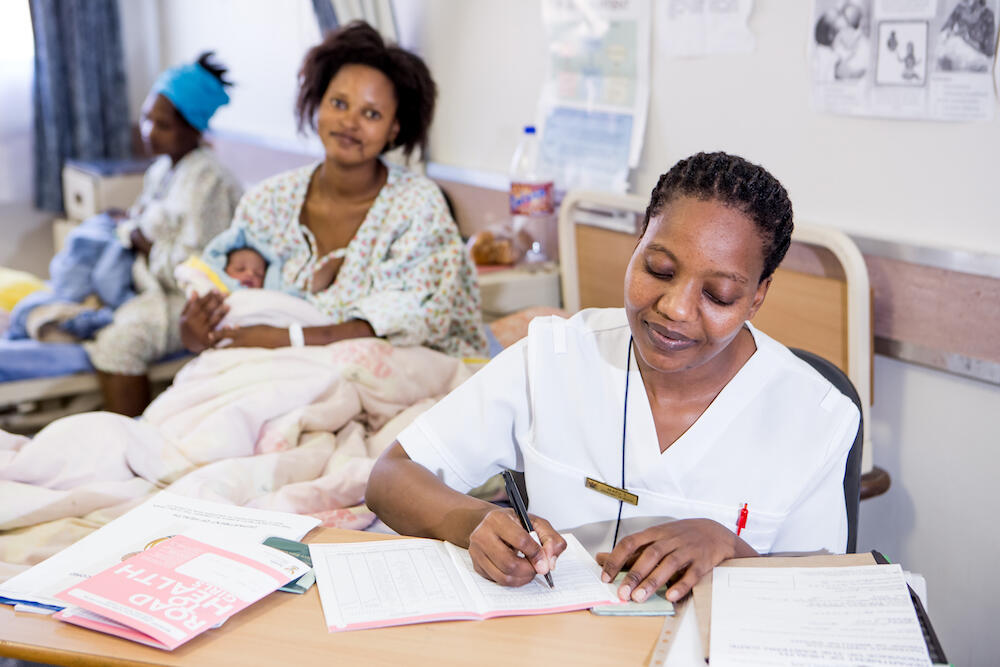Pregnant mothers giving birth during COVID-19-related lockdowns face uncertainty and potentially life-threatening challenges. Bonang Motlaung*, a 33-year-old mother of three, shares her personal journey.
JOHANNESBURG, South Africa—“The possibility of the school year being disrupted by the national lockdown made my heart race as I pondered how my 14-year-old and 5-year-old would complete their learning this year. I wasn’t too concerned about my son, aged one, as he was at play school during the day while I earned an income.
“I work as an insurance sales agent; my income is based on commission with no company benefits. So when the national lockdown was announced, I got quite worried because it meant my income would be affected.
My anxiety was exacerbated by the fact that I was due to give birth in a few weeks and was concerned about leaving my three children at home alone.
“My anxiety was exacerbated by the fact that I was due to give birth in a few weeks and was concerned about leaving my three children at home alone while I was in hospital giving birth to my fourth child.
“In the first week of the lockdown, I experienced labour pains and took public transport to a public hospital about eight kilometres away. I arrived at the hospital during the mid-morning rush and was attended to in the afternoon. It turned out I was suffering from Braxton Hicks [contractions] and was not in labour. After the consultation, she suggested I go home or sit on a hospital bench and wait for the contractions to subside.
“As I sat on the hard metal bench, squeezing myself in between patients to find comfortable seating, I realised there were no masks or sanitizers in sight. Nor were we sitting one metre apart from one another or practising [physical] distancing as per the government guidelines. I decided to go home.
“A few days later, the labour pains started again and were becoming more pronounced. I called the ambulance service this time and felt awful asking my neighbour to look after my children, but I had no choice. I felt relieved when the ambulance arrived, but scared when informed that my safety wasn’t guaranteed as the ambulance had been ferrying various patients since daybreak and I would be getting in at my own risk! I was in labour and I needed to get to the hospital. Getting into that vehicle, I felt helpless and like I was walking on a tightrope due to my pregnancy status.
I couldn’t help but be thankful to the nurses, the primary caregivers working tirelessly under difficult circumstances, often risking their own lives and well-being to ensure women like me give birth safely.
“At the hospital, the doctor confirmed that I was in labour but not yet dilating. I needed to be prepared for a Caesarean section. The theatre was cold but I was grateful that I had been given a bed in the maternity ward and would finally deliver my baby. I gave birth to a healthy baby and, while holding him, I couldn’t help but be thankful to the nurses, the primary caregivers working tirelessly under difficult circumstances, often risking their own lives and well-being to ensure women like me give birth safely.
“I remembered I had been worried about contracting the coronavirus, the loss of income, zero maternity benefits and the absent fathers of my other children, but now that I’m back home, with both of us healthy and recovering fairly well, I’m focusing on being a good mother in these trying times.”
UNFPA supports the South African Department of Health to ensure the continuity of sexual and reproductive health services and to mitigate against any disruptions to access to essential sexual and reproductive health and rights, and maternal health services for adolescents, youth and pregnant women, through the provision of mobile health services in the COVID-19 high-burden provinces of Gauteng, Western Cape and KwaZulu-Natal.
- Ziyanda Ngoma
* Name changed to protect her privacy.


